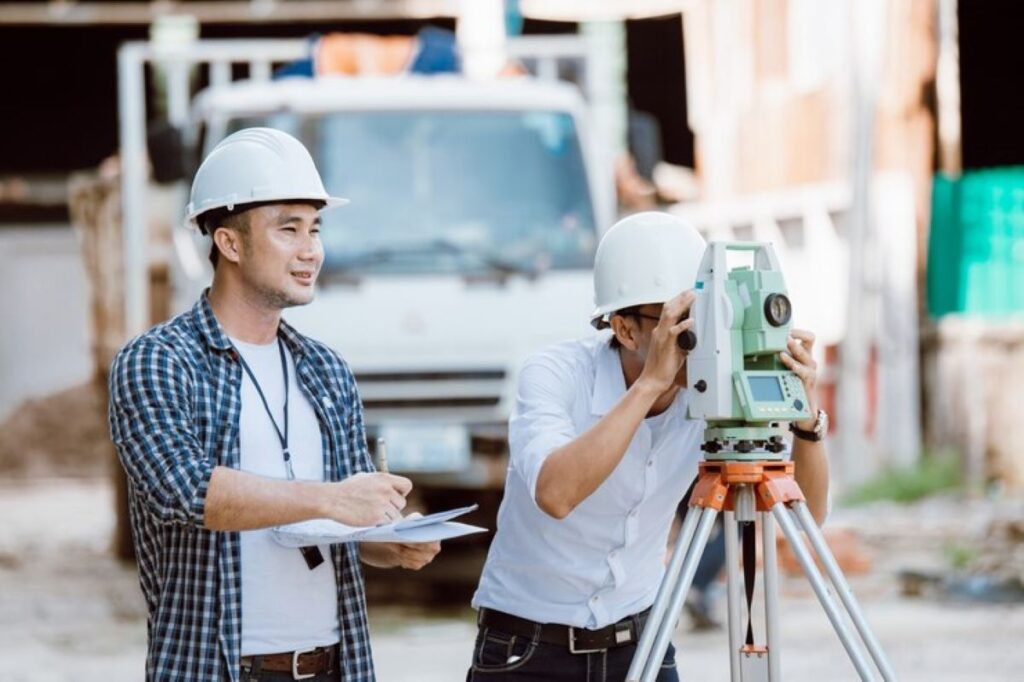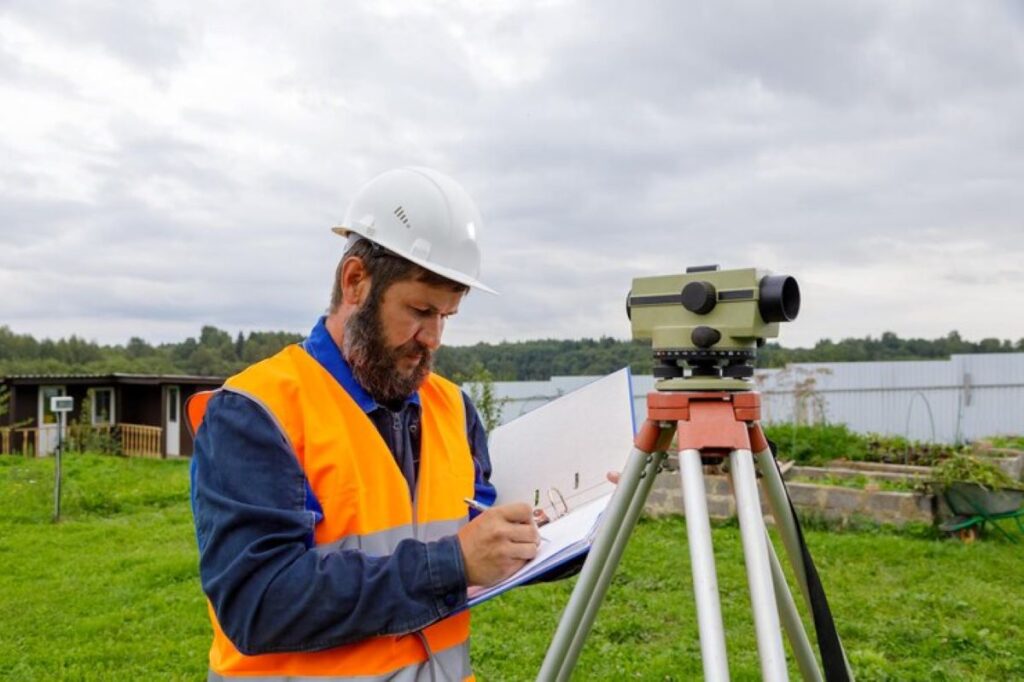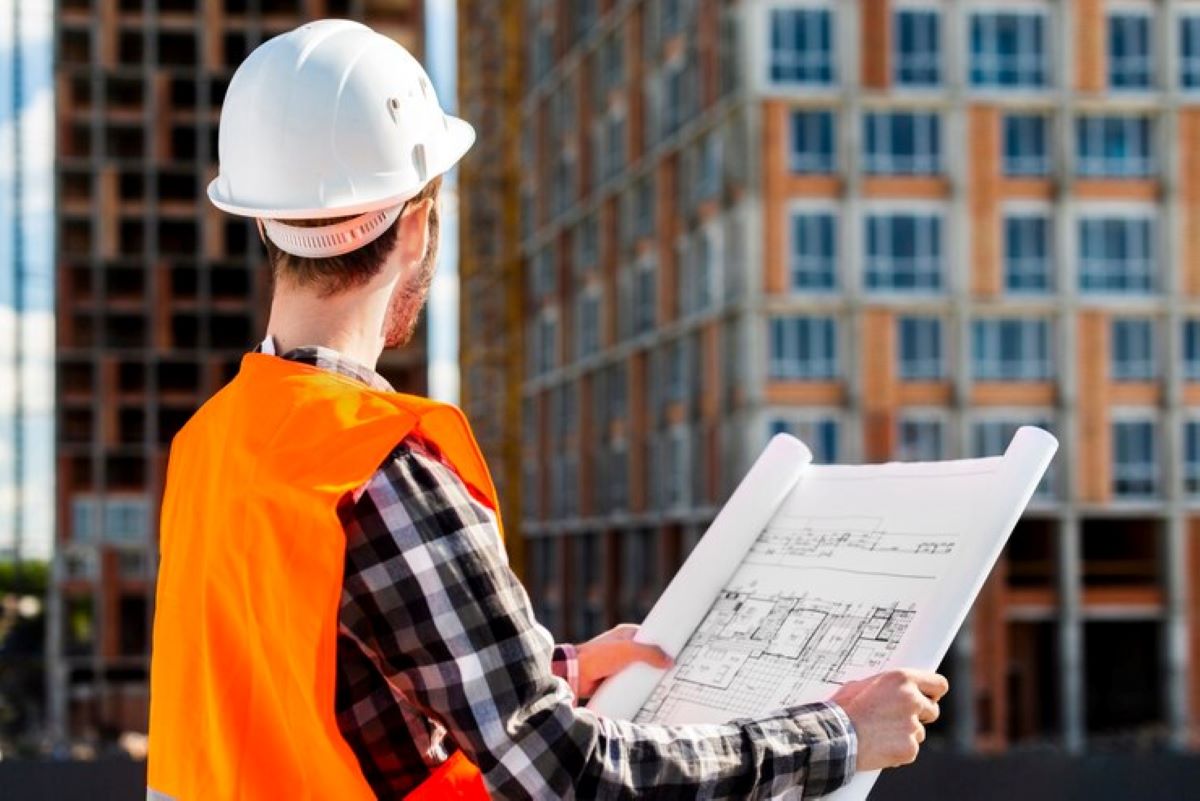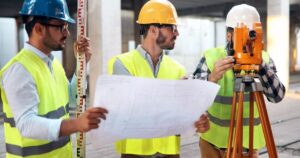Construction surveying is a critical aspect of large-scale developments, ensuring accuracy, efficiency, and safety throughout the construction process. In this article, we will delve into the multifaceted role of construction surveyors, the impact of technology on their work, and the challenges they face. As we explore these facets, it will become clear how indispensable construction surveyors are in managing large-scale projects.
Understanding the Job of a Construction Surveyor
A construction surveyor plays a crucial role in the planning, execution, and management of construction projects. They utilise a combination of mathematical skills, technical knowledge, and on-site experience to provide accurate measurements and data that guide the construction process.
At the foundation of their work is the need to translate engineering designs into physical structures. They spend considerable time in the field, using advanced equipment to survey and map out sites, ensuring that developments are built in the correct locations and meet the specifications provided by architects and engineers. This process often involves liaising with local authorities to ensure compliance with zoning laws and regulations, which can vary significantly from one location to another. Their expertise not only helps in avoiding costly mistakes but also contributes to the overall safety and integrity of the construction project.
Key Responsibilities of a Construction Surveyor
The responsibilities of construction surveyors are varied and include:
- Conducting initial site surveys to establish accurate positions and benchmarks.
- Preparing detailed reports and documentation of surveys for project stakeholders.
- Collaborating with engineers and architects to interpret design drawings and plans.
- Performing calculations to determine elevations and alignments.
- Using GPS and total stations for precise measurements.
- Monitoring construction progress against established benchmarks.
- Conducting final surveys to verify that the completed work meets specifications.
In addition to these responsibilities, construction surveyors are often called upon to resolve disputes that may arise during the construction process. Their detailed knowledge of the site and the surveying data they collect can provide critical evidence in discussions about project timelines, costs, and compliance with the original plans. Furthermore, as technology continues to evolve, surveyors are increasingly incorporating 3D modelling and drone surveying into their work, which enhances accuracy and efficiency in data collection.
Required Skills and Qualifications for a Construction Surveyor
To excel as a construction surveyor, individuals must possess a unique blend of skills and qualifications. Typically, a degree or diploma in surveying, civil engineering, or a related field is essential.
Key skills include strong mathematical abilities, problem-solving skills, and proficiency with surveying equipment and software. Additionally, effective communication skills are crucial, as surveyors must work collaboratively with various stakeholders, including clients, construction teams, and government agencies. Certification from recognised professional bodies, such as the Royal Institution of Chartered Surveyors (RICS), can enhance credibility and career prospects. Moreover, a keen understanding of environmental considerations and sustainability practices is becoming increasingly important in the industry, as more projects aim to minimise their ecological footprint. This knowledge not only aids in compliance with environmental regulations but also reflects a growing commitment to responsible construction practices.
The Importance of Construction Surveyors in Large-Scale Developments
Construction surveyors hold a pivotal role in the success of large-scale developments. Their expertise contributes greatly to the overall efficiency of construction processes, impacting timelines and budgets significantly.
Ensuring Accuracy and Precision in Construction Projects
One of the primary functions of a construction surveyor is to ensure that construction projects are executed with precision. This accuracy is vital not only for aesthetics but also for adhering to safety standards and regulations. A minor error in measurements can lead to costly rework, delays, or even safety hazards.
By providing precise layout and reference points, construction surveyors help avoid such issues. Their insights ensure that structures are built according to design specifications, which leads to higher quality outcomes and reduced risk of disputes or litigation. Additionally, the use of advanced technology, such as 3D laser scanning and GPS systems, has revolutionised the surveying process. These tools allow for real-time data collection and analysis, enabling surveyors to make informed decisions quickly, thereby enhancing the overall workflow and productivity on site.

Mitigating Risks and Managing Safety Measures
Construction sites are inherently risky environments, and construction surveyors play a significant role in managing these risks. By conducting thorough site assessments and ongoing monitoring, they help identify potential hazards and ensure that necessary safety measures are in place.
Moreover, surveyors assist in creating safe work environments by establishing clear boundaries and markers. Their commitment to safety not only protects workers but also minimises the risk of project delays and financial losses caused by accidents. In addition to physical safety, construction surveyors also contribute to environmental safety by ensuring that projects comply with local regulations regarding land use and environmental impact. This includes assessing the potential effects of construction on surrounding ecosystems and advising on measures to mitigate any negative impacts, thus fostering a more sustainable approach to development.
The Process of Construction Surveying in Large-Scale Projects
The process of construction surveying in large-scale projects can be broken down into several stages, each crucial to the overall success of the development.
Initial Site Survey and Data Collection
The initial site survey is among the most critical phases of the construction surveying process. During this stage, surveyors collect essential data regarding the topography, existing structures, and geographical features of the site.
Using a combination of traditional tools and modern technology, such as laser scanning and GPS systems, surveyors create a detailed representation of the site. This information forms the foundation for the planning and design stages of the project, allowing engineers and architects to create schedules and budgets based on accurate data.
Moreover, the initial site survey also involves an assessment of environmental factors that may impact the construction process. Surveyors often evaluate soil conditions, hydrology, and potential ecological sensitivities to ensure that the project complies with local regulations and environmental standards. This comprehensive approach not only aids in the design process but also helps in mitigating risks associated with unforeseen environmental challenges, which can lead to costly delays if not addressed early on.
Ongoing Monitoring and Adjustments During Construction
Once construction begins, the role of the surveyor evolves to one of ongoing monitoring and adjustments. Regular check-ins allow surveyors to ensure that construction proceeds according to the established limits and specifications.
They may need to recalibrate measurements or adjust plans in response to unexpected site conditions, ensuring that the project stays on track. This adaptability is vital in large-scale developments, where even slight deviations can result in substantial implications.
In addition to monitoring physical measurements, surveyors also play a key role in coordinating with various stakeholders, including contractors, project managers, and local authorities. This collaboration is essential for resolving any discrepancies that may arise during construction. By maintaining open lines of communication and providing timely updates on site conditions, surveyors help facilitate a smoother workflow, ultimately contributing to the successful completion of the project. Their expertise ensures that all parties are aligned with the project’s goals, paving the way for efficient problem-solving and decision-making throughout the construction phase.
See Also : Why Hiring Professional Construction Surveyors Is Essential for Accuracy
The Impact of Technology on Construction Surveying
Advancements in technology have revolutionised the field of construction surveying. Modern tools not only increase efficiency but also enhance the accuracy of measurements, making the life of a construction surveyor significantly easier.
Modern Tools and Software Used in Construction Surveying
Surveyors today have access to a wide array of advanced tools and software, which streamline the surveying process. For example, geographic information systems (GIS) and computer-aided design (CAD) software allow surveyors to visualise data and create comprehensive maps.
Additionally, the use of drones for aerial surveying provides detailed topographical information that can be hard to gather from the ground. These technologies enable surveyors to perform their jobs more efficiently and with greater accuracy, ultimately leading to improved project outcomes. The integration of laser scanning technology further enhances the precision of data collection, allowing for the creation of 3D models that can be used for analysis and planning. This not only saves time but also reduces the risk of errors that can occur with traditional surveying methods.
The Future of Construction Surveying: Automation and AI
The future of construction surveying is poised to integrate more automation and artificial intelligence (AI). With the ability to analyse large sets of data quickly, these technologies can predict potential issues and streamline workflows.
As AI technology continues to develop, it will likely lead to even more innovations in how surveyors operate, from automating routine tasks to enhancing decision-making processes. For instance, machine learning algorithms can be employed to improve the accuracy of predictive models, allowing surveyors to anticipate challenges before they arise. Furthermore, the potential for augmented reality (AR) in surveying offers exciting possibilities, enabling surveyors to overlay digital information onto the physical world, thus facilitating real-time data analysis and collaboration among project teams. Embracing these technologies will be essential for surveyors aiming to maintain their relevance in a rapidly evolving industry.

Challenges Faced by Construction Surveyors in Large-Scale Developments
Despite their crucial role, construction surveyors face numerous challenges that can complicate their work and affect project outcomes.
Dealing with Complex Construction Designs
One of the primary challenges faced by construction surveyors is the increasing complexity of construction designs. As developers and architects push the boundaries of design, surveyors must adapt to new requirements and challenges presented by intricate structures.
This complexity often requires advanced surveying techniques and a robust understanding of architectural principles, putting additional pressure on surveyors to keep up with industry trends and innovations. Furthermore, the integration of sustainable practices and the use of innovative materials can add layers of difficulty, as surveyors must ensure that their measurements and assessments align with both environmental standards and the latest technological advancements.
Managing Time Constraints and Project Deadlines
In large-scale projects, time constraints and tight deadlines are commonplace. Construction surveyors often find themselves in high-pressure situations where accurate data must be provided quickly to keep the project on schedule.
Meeting these demanding timelines while ensuring precise measurements is a delicate balance that surveyors must navigate daily. Effective time management, prioritisation, and communication skills are essential to successfully overcoming these challenges. Additionally, the reliance on digital tools and software for data collection and analysis has become increasingly vital, as these technologies can streamline workflows and enhance accuracy. However, the need for continuous training in these evolving tools adds another layer of complexity to their role, as staying proficient is crucial for maintaining competitive advantage in the field.
Moreover, the collaboration between various stakeholders, including architects, engineers, and contractors, can lead to further complications. Miscommunication or misalignment of objectives can result in delays and costly errors, making it imperative for surveyors to cultivate strong relationships and clear lines of communication among all parties involved. This collaborative approach not only helps in mitigating risks but also fosters a more cohesive working environment, ultimately contributing to the success of the project.


